I'm new to antlr, i'm trying to make simple grammar but i can't succeeded. I would like to parse this kind of file:
BEGIN HEADER
CharacterSet "CP1252"
END HEADER
BEGIN DSJOB
test "val"
END DSJOB
BEGIN DSJOB
test "val2"
END DS
JOB
I'm using this kind of grammar :
grammar Hello;
dsxFile : headerDeclaration? jobDeclaration* EOF;
headerDeclaration : 'BEGIN HEADER' param* 'END HEADER';
jobDeclaration : 'BEGIN DSJOB' subJobDeclaration* param* 'END DSJOB';
subJobDeclaration : 'BEGIN DSSUBJOB' param* 'END DSSUBJOB';
headParam
: ( 'CharacterSet'
| 'name'
) StringLiteral
;
// ANNOTATIONS
param : PNAME PVALUE;
PNAME :StringCharacters;
PVALUE :StringCharacters;
// STATEMENTS / BLOCKS
//block
// : '{' blockStatement* '}';
// LEXER
// Keywords
ABSTRACT : 'abstract';
ASSERT : 'assert';
BOOLEAN : 'boolean';
BREAK : 'break';
BYTE : 'byte';
CASE : 'case';
CATCH : 'catch';
CHAR : 'char';
CLASS : 'class';
CONST : 'const';
CONTINUE : 'continue';
DEFAULT : 'default';
DO : 'do';
DOUBLE : 'double';
ELSE : 'else';
ENUM : 'enum';
EXTENDS : 'extends';
FINAL : 'final';
FINALLY : 'finally';
FLOAT : 'float';
FOR : 'for';
IF : 'if';
GOTO : 'goto';
IMPLEMENTS : 'implements';
IMPORT : 'import';
INSTANCEOF : 'instanceof';
INT : 'int';
INTERFACE : 'interface';
LONG : 'long';
NATIVE : 'native';
NEW : 'new';
PACKAGE : 'package';
PRIVATE : 'private';
PROTECTED : 'protected';
PUBLIC : 'public';
RETURN : 'return';
SHORT : 'short';
STATIC : 'static';
STRICTFP : 'strictfp';
SUPER : 'super';
SWITCH : 'switch';
SYNCHRONIZED : 'synchronized';
THIS : 'this';
THROW : 'throw';
THROWS : 'throws';
TRANSIENT : 'transient';
TRY : 'try';
VOID : 'void';
VOLATILE : 'volatile';
WHILE : 'while';
// Boolean Literals
BooleanLiteral : 'true' | 'false';
// Character Literals
fragment
SingleCharacter
: ~['\\] ;
// String Literals
StringLiteral
: '"' StringCharacters? '"'
;
fragment
StringCharacters
: StringCharacter+
;
fragment
StringCharacter
: ~["\\]
;
// Separators
LPAREN : '(';
RPAREN : ')';
LBRACE : '{';
RBRACE : '}';
LBRACK : '[';
RBRACK : ']';
SEMI : ';';
COMMA : ',';
DOT : '.';
// Operators
ASSIGN : '=';
GT : '>';
LT : '<';
BANG : '!';
TILDE : '~';
QUESTION : '?';
COLON : ':';
EQUAL : '==';
LE : '<=';
GE : '>=';
NOTEQUAL : '!=';
AND : '&&';
OR : '||';
INC : '++';
DEC : '--';
ADD : '+';
SUB : '-';
MUL : '*';
DIV : '/';
BITAND : '&';
BITOR : '|';
CARET : '^';
MOD : '%';
ADD_ASSIGN : '+=';
SUB_ASSIGN : '-=';
MUL_ASSIGN : '*=';
DIV_ASSIGN : '/=';
AND_ASSIGN : '&=';
OR_ASSIGN : '|=';
XOR_ASSIGN : '^=';
MOD_ASSIGN : '%=';
LSHIFT_ASSIGN : '<<=';
RSHIFT_ASSIGN : '>>=';
URSHIFT_ASSIGN : '>>>=';
//
// Additional symbols not defined in the lexical specification
//
AT : '@';
ELLIPSIS : '...';
//
// Whitespace and comments
//
WS : [ \t\r\n\u000C]+ -> skip
;
COMMENT
: '/*' .*? '*/' -> skip
;
LINE_COMMENT
: '//' ~[\r\n]* -> skip
;
But i'm still getting this issue :
line 1:0 mismatched input 'BEGIN HEADER\r\n\tCharacterSet ' expecting {, 'BEGIN HEADER', 'BEGIN DSJOB'} (dsxFile BEGIN HEADER\r\n\tCharacterSet "CP1252" \r\nEND HEADER\r\nBEGIN DSJOB\r\n\ttest "val" \r\nEND DSJOB)
Can someone explain me what does it means ? It seems it can't skip \r\t.
Thanks for your help guys !
